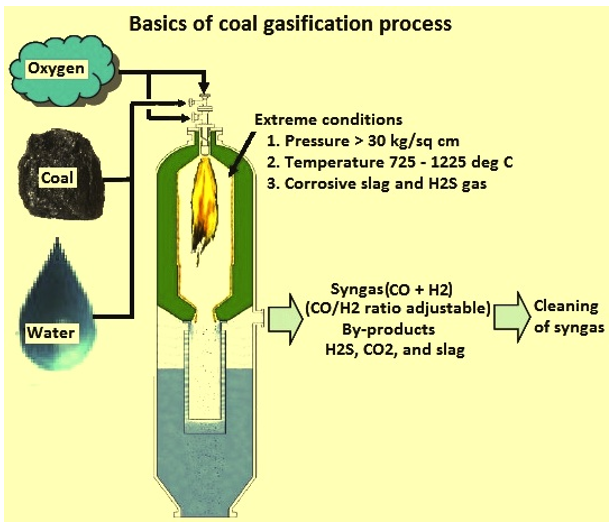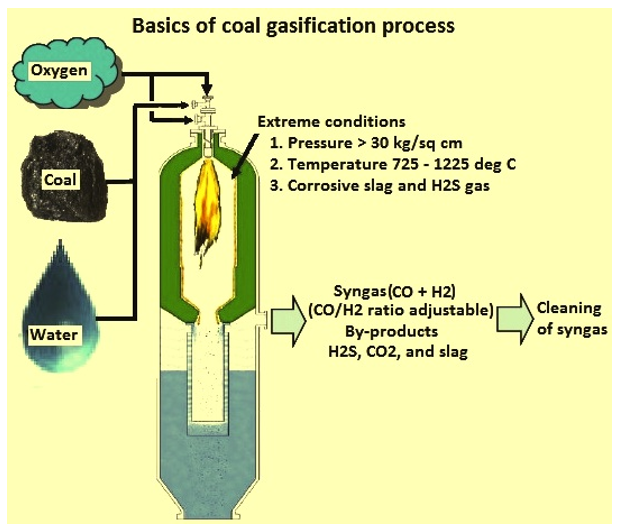- Courses
- GS Full Course 1 Year
- GS Full Course 2 Year
- GS Full Course 3 Year
- GS Full Course Till Selection
- MEP (Mains Enrichment Programme) Data, Facts
- Essay Target – 150+ Marks
- Online Program
- GS Recorded Course
- NCERT- First Ladder
- Polity
- Geography
- Economy
- Ancient, Medieval and Art & Culture AMAC
- Modern India, Post Independence & World History
- Environment
- Governance
- Science & Technology
- International Relations and Internal Security
- Disaster Management
- Ethics
- Current Affairs
- Indian Society and Social Issue
- CSAT
- 5 LAYERED ARJUNA Mentorship
- Public Administration Optional
- ABOUT US
- OUR TOPPERS
- TEST SERIES
- FREE STUDY MATERIAL
- VIDEOS
- CONTACT US
Scheme for Coal Gasification
Scheme for Coal Gasification
24-07-2023

Latest Context:
- Recently, Coal Ministry is considering to announce a comprehensive scheme to promote coal gasification.
- The scheme would be applicable for both Public Sector Undertakings and the Private Sector.
- The government aims to gasify 100 million tonnes (MT) of coal by 2030. This will help India to achieve self-reliance and energy security.
What is Goal Gasification?
- Coal Gasification is a process that converts coal deposits into synthesis gas, which is also called as Syngas.
- As coal deposits are difficult to mine, the deposits are converted into Syngas, which is a mixture of carbon dioxide, carbon monoxide and hydrogen.
- Coal Gasification is gaining popularity as it produces power with least harm to the environment using the readily available raw material coal.
- The resulting Syngas can be further used as a fuel or it can be processed further to produce other essential chemicals and fertilizers.

Need for Coal Gasification:
- As Coal Gasification helps in converting coal into useful products, it can help India reduce the imports of natural gas, methanol and ammonia.
- It can help us revolutionize the coal sector by using coal for deriving other essential products.
- Currently, India is importing around 50% of Natural Gas, around 90% of Methanol and around 13-15% of ammonia to meet our domestic demand.
- Coal Gasification will help government’s Atmanirbhar Bharat vision to fructify.
Significance of Coal Gasification:
- Coal gasification produces less emissions and it helps to produce high-value products from coal.
- Coal Gasification will help India achieve the targets committed during the Paris Agreement of 2016. Under the agreement, India has committed to decrease emissions intensity of India’s GDP by 33-35% compared to 2005 levels by 2030, increase total cumulative electricity generation from clean energy sources to 40% by the same year and to create 2.5-3 billion tons of additional carbon sink through increasing forest and tree cover.
- By replacing expensive imported coking coal with syngas, Steel companies can reduce costs to a great extent.
Challenges of Coal Gasification:
- The gasification projects face challenges in terms of costs, technology and financing as setting up of coal gasification plant requires large investments because it requires land, water and electricity and also a long gestation period (time taken for positive outcome).
- India lacks the expertise of highly skilled engineers and workers for the installation and successful execution of the coal gasification project.
- Quality of coal available in India has high ash content making the quality poor. Converting the coal which has high ash to syngas is a major challenge.
Government’s Incentives:
- Coal Ministry’s ₹6,000 crore scheme will have three segments to support the coal gasification project in India.
- The first segment will support government public sector undertaking projects.
- The second segment will support for private and PSU projects which will be selected through competitive bidding.
- The third segment will support funding for demonstration projects which will use indigenous technology for the small-scale gasification plants.
- Coal Ministry is also providing an additional incentive by reimbursing the GST compensation cess paid on coal used in gasification projects.
- The reason behind this incentive is to help the companies who are undertaking gasification projects. Normally, the companies would be able to claim an input tax credit for the GST compensation cess paid on coal. However, since the coal is used for gasification and not sold, they cannot claim the input tax credit. So the proposed reimbursement aims to offset this inability and compensate the entities.
|
Input credit means reducing the tax that you have already paid on inputs while paying tax on output. E.g. For a manufacturer- a. Tax payable on output in ₹ 500 and b. Tax paid on input is ₹150. Now, here the manufacturer can claim the input credit of ₹150. So, the manufacturer has to pay 500-150=₹350 |
- To promote a rapid scale-up of coal gasification technologies and projects, Coal Ministry is providing financial support and tax incentives so that more and more companies would undertake the project.
- This will help reduce import dependence, create jobs and push a transition to a greener economy.
Must Check: IAS Coaching Centre In Delhi



